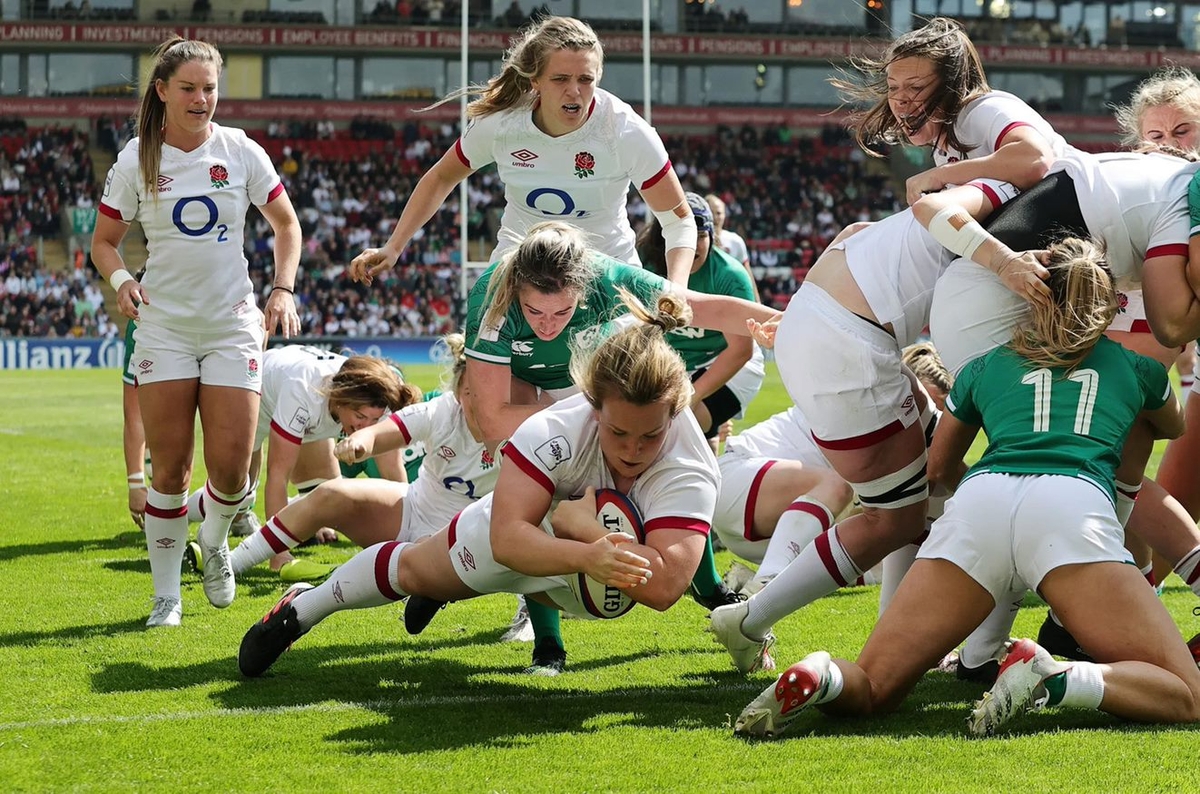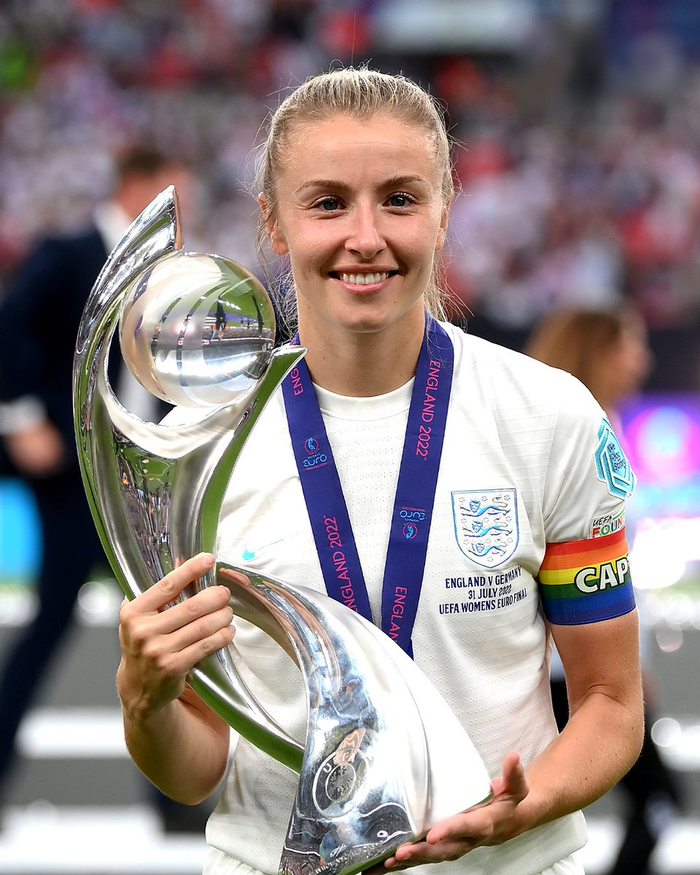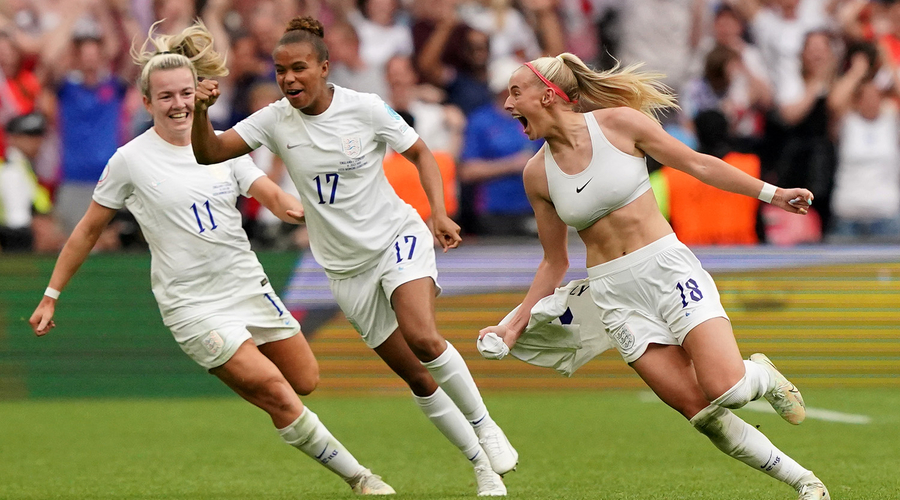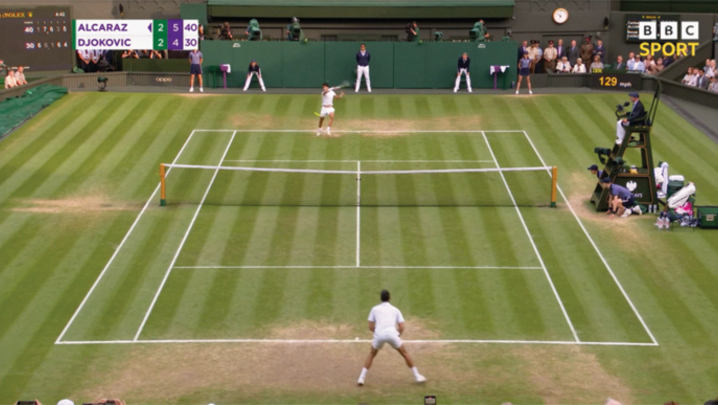Caitlin Danaher lauds the Lionesses’ success and assesses how television coverage of other women’s sports might benefit.
May 2016. Tears cascade at the King Power Stadium as Andrea Bocelli serenades a sea of ecstatic, incredulous Leicester City fans. We’ve achieved the impossible, our team of giant-slaying underdogs have toppled the phenomenally rich “top six” Goliaths of modern-day football, defying odds of 5,000/1 to lift the Premier League trophy. It’s surely the most historic football moment I will ever experience. At 18, my life as a football fan has peaked.
July 2022. I’m part of the largest crowd ever seen at a European Championship final, men’s or women’s, as the Lionesses face old foes Germany at Wembley. Despite the historic rivalry, the atmosphere is one of pure celebration. No boos echo as the opposing team sings their national anthem. Instead, a record-breaking 87,192 fans prepare to savour a game that, regardless of the result, will go down in history as a watershed moment for women’s football.
An audacious dink from Ella Toone. A scrappy goal sensationally celebrated by Chloe Kelly. The Lionesses defeat eight-time winners Germany 2-1 to clinch England’s first major international trophy for 56 years. Having been banned by the FA for half a century, denied the opportunity to play in school, faced with years of underfunding, misogyny, abuse and indifference, it’s England’s women who finally bring football home. At 24, my life as a football fan is only just beginning.
The Euros final reached an audience peak of 17.4 million on BBC One, with a further 5.9 million watching online – by some distance, the most watched women’s football game on UK television, ever. “In 2009, the women’s Euros total TV reach was 2.5 million. Fast forward and we’re now seeing the reach for the 2022 Euros at 27.4 million,” says the BBC’s head of TV sport, Philip Bernie. “This summer really was a game-changer. Women’s football will never be the same again.”
For the uninitiated, the explosion of the sport and its stars this summer may seem to have come from nowhere, but it has been building for years.
In 2017, 4 million viewers tuned in to Channel 4 to watch the Netherlands knock out England in the Uefa women’s Euro semi-final. “It looks a little bit small fry now, but it was a big moment in terms of women’s football, and that was a big risk that the channel took at the time,” says Channel 4’s commissioning editor for sport, Joe Blake-Turner.
Since then, the women’s game has been the fastest-growing sport on TV. Last year, the women’s domestic game received a huge boost when the FA Women’s Super League signed a landmark broadcast deal with Sky and the BBC. The mixture of paid and free-to-air television offered the league both a significant investment and a huge rise in exposure, as broadcast audiences increased by 258%.
“I think that the BBC is going to have real competition on its hands from ITV, which saw the enormous audience the BBC had [for the Euros final]. It’s going to be interesting to see how that plays out" - Sports rights specialist Lisa Parfitt on the Fifa Women’s World Cup
Meanwhile, DAZN secured the hugely coveted global rights for the Uefa Women’s Champions League (WCL). As part of the four-season deal, the streamer has partnered with YouTube to make the first two years available free. It’s the first time Uefa has centralised all Women’s Champions League matches globally; viewership figures for season one are impressive, with fans tuning in from 230 territories.
Of course, the timing of DAZN’s deal with Uefa is no happy accident. With this year’s Euros and next year’s World Cup, DAZN hopes to capitalise on the peak in interest in women’s football to add new subscribers. “We knew that this momentum and this emphasis was coming, and we structured our deal accordingly,” says Katie Smith, VP of rights partner relations at DAZN. “It’s just exploded, which is brilliant for us. We’re looking forward to seeing how that translates into viewership, both on YouTube and on DAZN.”
Fans looking to follow up on their favourite Euros players will find many of them in the WCL, including finalists Lucy Bronze (Barcelona Femení) and Young Player of the Tournament Lena Oberdorf (Vfl Wolfsburg). Yet, as 80% of WCL audiences are male, DAZN’s next challenge is to find a way to bring in more female viewers.
The key to this will be constructing a mythology: after all, what is football without theatre? “We have to start telling more stories about the players, building more narratives,” says Smith, “so that fans aren’t just watching the highlights and seeing the incredible goals, they’re being given a compelling reason to watch, and they have a ‘why’ to get into the women’s game.”
Take DAZN’s spotlight on Ballon d’Or winner Alexia Putellas of Barcelona Femení. A 10-year-old girl witnesses football’s greats, Ronaldinho, Eto’o, Zidane and Ronaldo, battle it out in the El Clásico 2004. Years later, she is playing in front of a sold-out crowd of 91,553 at Camp Nou in her own El Clásico.
The history-making Champions League quarter-final against arch-rivals Real Madrid would mark the highest attendance ever seen at a women’s football game, only for Barcelona to break that record once more in their semi-final against Wolfsburg. The possibilities for the women’s game to produce its own icons are endless, if only they are given the time and investment by national broadcasters.
So, what happens next? While the excitement around women’s football has been spectacular, sports rights specialist Sarah Parfitt warns that change won’t happen overnight: “It’s going to take a few cycles of rights deals before the domestic clubs become financially sustainable. That’s a bit of a wake-up call to realise how far it is we’ve still got to go.
“The more the commercial investment from brands, the better the rights deals and the more tickets that are sold, the more financially sustainable the domestic clubs will be,” she adds. “Effectively, that is the same equation across all women’s sports.”

The success in women’s football has been a rallying cry to governing bodies, the media and brands to show what is possible, with exponential growth in other sports very likely to follow.
Women’s rugby has already seen enormous growth this year with the huge success of the Six Nations. Rather than running the women’s competition alongside the men’s as a secondary brand, the BBC gave it a separate window in April. The final round of games aired on BBC Two gave the sport crucial space and visibility in the broadcast schedule.
The Women’s Sports Trust reports that viewing figures increased by 627% on last year, making it the most-watched Women’s Six Nations on record. Such stats will be music to the ears of ITV, which secured the rights for the Women’s Rugby World Cup, which is being held in New Zealand this October.
Elsewhere, women’s cricket has also experienced a huge influx of investment. The prize money for the ICC Women’s Cricket World Cup 2022 was raised to $3.5m, up 75% on 2017.
Sky recently announced that it would extend its broadcast deal with the ECB for another four years. This will give England Women a defined scheduling commitment for the first time, with two T20 internationals screening free-to-air.
The Hundred, which was shown across the BBC and Sky this summer, has also been a boon to cricket. Designed with gender parity at its heart, the competition sees teams with both men and women’s squads playing in the same grounds, often in back-to-back matches.
The competition launched in 2021 with a standalone women’s game broadcast live on the BBC, during which thousands of tickets to other women’s games were sold. “What the Hundred has done for the women’s game is almost immeasurable. The visibility that it provided the women’s game last year was incredible,” says Parfitt.
Expect to see some serious bids for the rights to next year’s Fifa Women’s World Cup, which Parfitt describes as “one of the UK’s crown jewels”. She adds: “I think that the BBC is going to have real competition on its hands from ITV, which saw the enormous audience the BBC had [for the final]. It’s going to be interesting to see how that plays out.”
The corporation stole a march in 2017, so might Channel 4 throw its hat in the ring? Its commissioning editor for sport is giving nothing away, but the goal is to remain very much in the space of women’s sport.
“The cat’s out the bag now, everyone’s on it,” says Channel 4’s Blake-Turner. “So, we’ll have to develop a different tactic. But it’s clearly the place to be.”
'If you can see it, you can be it'

‘You have all set an example that will be an inspiration for girls and women today, and for future generations.’ So read the Queen’s congratulatory message to the Lionesses.
One phrase, repeated countless times by presenters and pundits alike over the course of the Euros, summarised the transcendent hopes for the tournament’s legacy: ‘If you can see it, you can be it.’
A whole new audience has been brought to women’s football thanks to the BBC’s unprecedented TV coverage. Inspired by the Lionesses’ heroics, the next generation of women footballers will be entering a new world.
This will be a world where women’s football can pack the biggest stadium in the UK, where it’s normal to air a women’s match on prime-time TV – and where an English team can actually win.
Now, thousands of young girls can dare to dream of lifting a major football trophy for their country. One such hopeful is 13-year-old Eloise Mitchell, who lives and breathes football.
Eloise plays for Crystal Palace under-14s. Like her favourite player, Fran Kirby, she’s a central midfielder with an appetite for smashing in goals from 25 yards out. Last season, her goal tally ran to double figures.
When I ask her what she can imagine being when she grows up other than a professional footballer, she looks puzzled, wracking her brain, before replying, ‘Nothing’.
Having been to three women’s FA cup finals and several WSL games, the Euros have been another inspirational experience for Eloise, who hopes that, one day, she can play for England and even win a world cup.
Shouting over the thunderous crowd, England captain Leah Williamson’s post-match interview to BBC Sport contained a rousing proclamation for the millions watching at home: ‘I tell you what, the kids are alright’. With role models like these, they certainly will be.





